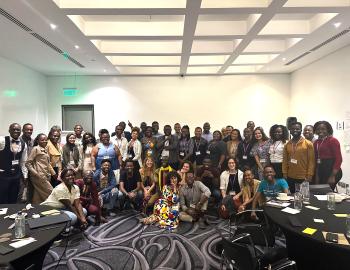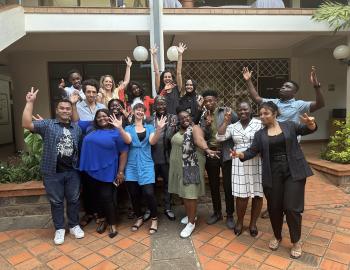Justice in a changing climate
Justice in a changing climate
Context
The causes of climate change lie predominantly with the rich, industrialised countries of the global North. Yet the impacts of these changes are disproportionally affecting the marginalised groups and communities of the global South that have been subject to historical, systemic discrimination. Despite this, these communities are rarely included in decision making and implementation of climate action thereby limiting the possibility of just transformational climate solutions.
In response, the CDKNJ team designed and implemented a climate justice award programme that disbursed 12 awards of US $ 4,000 each to young people in Africa, one in Brazil and one in Indonesia to implement climate justice projects. The project was implemented with input and the support of the Voices for Climate Action programme (through the Hivos team) and in close partnership and collaboration with the Global Landscapes Forum.
Knowledge brokering and collaborative learning approaches were employed in working with local communities that effectively advocated for financing locally shaped, inclusive and just climate action. The objectives were accompanied by work areas that spanned four areas of justice: procedural, distributional, historical, and transformational.
Project objectives
General objective:
To empower local groups and communities that advocate for just and inclusive climate action.
Specific objectives:
-
Promote the use of inclusive, plural knowledge systems and approaches to achieve a common understanding across a range of stakeholders of what is required to realise climate justice.
-
Support the integration of gender and social inclusion into understandings of climate justice at multiple scales through advocacy and mutual capacity strengthening activities, which recognise intersectionality.
-
Champion distributional justice through the equitable financing of locally shaped climate action through promoting the uptake of existing appropriate community-based financing mechanisms and supporting advocacy for improved international finance of local climate action.
Project activities
CDKNJ selected twelve awardees:
-
Nature’s Yetu - Kenya
Focused on young mothers in Kibera, an informal settlement, who had never heard of eco-feminism, climate change nor climate justice and were now aware of these concepts, and what it meant for them in their own lives.
-
The Lost Colours - Indonesia
Highlighted in-depth information about climate change and its impact on the gradual disappearance of natural dye colours from traditional weaving due to climate change impacts on the island.
-
Youth and Urbanism Online Radio - Kenya
Created an online urban radio station that provided a voice for youth, particularly those in urban areas, to express their concerns about issues impacting them, with climate change being a central focus.
-
Green Rest – South Africa
Employed a place-making approach that relayed how shared spaces created opportunities for school-going youth to access networks, support and knowledge through the newly established after-school eco clubs.
-
The Crossroad: Voices of Justice - Tanzania
A podcast series that amplified the voices of Black, Indigenous people of colour who drove the climate justice movement. Highlighted the transformative experiences of individuals advocating for change.
-
Fatima’s House - Tunisia
A rich short film shot in the social observation documentary style that honours community, biodiversity, multispecies relationships, eco-system services/protection/ exploitation, place-making, cultural heritage and myth, as well as critiques and reflection on the commons.
-
EcoShe - Madagascar
Implemented workshops on climate justice, gender equality, storytelling, and advocacy which focused on women, prioritised marginalised and Indigenous communities with the inclusion of the “HeForShe” movement across cities in Madagascar.
-
Putting community kids and young adults on the frontline of climate and environmental actions - Cameroon
The project increased climate change awareness information to learners within schools which ensured activities were embedded as part of learning to enhance sustainability.
-
‘Ei mana, toma conta do teu rio! (Hey sis, take care of your river!) - Brazil
The project held a series of meetings to coordinate, plan and define climate justice advocacy actions with the community. Youth were mobilised to fight for climate justice, territorial defence and the health of Amazonian waters through artistic expression
-
Climate Mental Health Initiative Project - Ghana
Incorporated doing “mental health differently” in the fight for climate justice which brought to the fore the burden that climate activists faced as they fought for climate justice.
-
Kijani Yetu - Kenya
The project grew from a food event that brought community members together and encouraged intergenerational knowledge sharing between local farmers, families, young people and children.
-
Educating and empowering marginalised Namibians towards climate action campaign - Namibia
The project engaged school eco-clubs in Namibia on climate justice which led to the creation of an information centre.
As part of the CDKNJ programme, the awardees were invited to attend the Global Landscapes Forum’s annual leadership camp and conference, in 2023 and 2024. This led to some of the awardees being offered opportunities including an internship in the youth team, a social media ambassador at GLF and a GLF Restoration Steward.
Additionally, four awardees were selected by IDRC as ‘seeds’ for a Systemic Justice project. The project aims to nurture African youth innovators as changemakers through strategic conversations about current adopted practices and their advancement in the future.
Project outputs
The project’s key outputs were:
-
The Lost Colours - a documentary film by Deden Ramadani from Indonesia
-
Resilience Amidst Climate Anxiety - a documentary film by Sylvia Hagan from Ghana
-
Experiential Learning on Nursery Management with Kids in Buea-Cameroon - a documentary film by Ndimuh B. Shancho from Cameroon
-
Conducted Eco-She training to 20+ women in Madagascar - Nancy Barisoa from Madagascar
-
The Crossroad: The Voices of Justice Unapologetic Human - a podcast series by Juvenal Vitalis from Tanzania
-
Nature's Yetu – a documentary film by Aida Namukose from Kenya
-
Youth and Urbanism Online radio – an online radio station by Edwin Odhiambo from Kenya
-
Hey sis, take care of your river! (Ei mana, toma conta do teu rio!) ecological march in the Amazon region by Pedro Alace from Brazil


